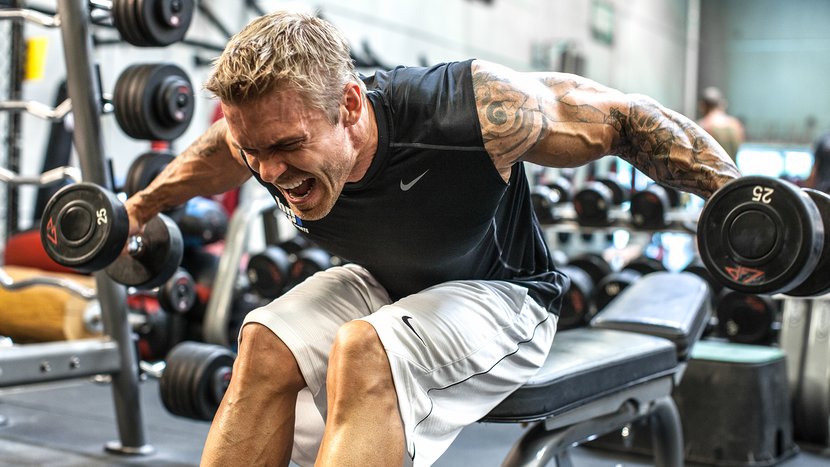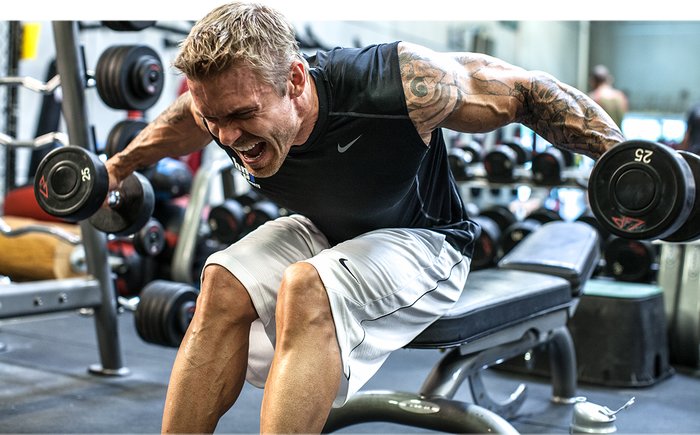
You went to depth on every squat rep and pushed your reverse lunges to failure. Your quads are beat and your hamstrings burn. Your workout was tough, but it didn't build an ounce of muscle.
The opportunity for muscle growth begins the moment you stop lifting, and that growth can't happen without proper recovery protocol. Muscles don't grow in the gym; they grow after. When you lift heavy, muscles suffer microtears and are actually broken down via a process called catabolism. Immediately after you lift, your body begins repairs, but it needs your help.
If you want to get the most from each and every workout, you need to prioritize post-workout recovery. Heed these eight tips to maximize recovery, stay on top of your game, and ensure maximum gains.
1. Push The Barrier, Don't Annihilate It
"No pain, no gain!" has probably been spat in your face as you struggled to rack a one-rep max bench press. Pushing beyond your limits is a good thing, you tell yourself, but just how far should you push? BPI Sports co-founder James Grage believes in egging the muscle on just enough to create that needed stimulus for muscle growth, but not in completely destroying it to the point where your muscle hurts for days.

"The focus shouldn't be on how fast you recover, but instead on how productive your recovery is," says James. If you constantly obliterate your body to complete and utter exhaustion with every workout, this damage accumulates over time and your body will revert its energy to repairing the downstream effects of the damage rather than building new muscle.
According to James, the trick is to "work out hard enough to push yourself past your comfort zones—trying to do more than you did the workout before, for example. Just don't destroy yourself entirely." By following this sage advice, you'll make solid and steady progress rather than taking one step forward and two steps back.
2. Get Serious About Pre-Workout Nutrition
By now, most people understand that the foods they eat after their workout and throughout the day factor into the quality of their recovery. The foods you eat before a workout can also play an important role in pre-empting the tissue-rebuilding process once the workout is over.
Digestion is a lengthy process; proteins and carbs that you ingest prior to the workout will still be circulating in the body afterward. For this reason, choose your foods wisely. Make sure you get high-quality, lean protein along with some complex carbohydrates, especially if you plan on an intense workout. I recommend consuming your meals roughly two hours prior to your workout to avoid digestive issues or cramps.
In addition to eating near your workouts, there have been substantial reported benefits of taking BCAAs before and during a workout, as well. James recommends using BEST BCAAs, which have been designed to encourage efficient absorption by the muscle cells. Grage takes one serving during his workout and then another serving right before bed.
3. Don't Skip The Stretching
Stretching probably doesn't sound sexy (or even necessary) when all you want is size, but it might be the most underrated player in muscle growth. By not having the necessary flexibility and muscle pliability, you might short yourself on muscular gains in many compound lifts. For example, if your ankles are too tight, you can't go deep enough in a squat to reap maximum benefits.
Barbara Bolotte, IFBB pro, stresses, "Make sure you allot at least 20 minutes after a workout to cool down and stretch. If you don't plan for it, you are more likely to skip it."
Stretching is a great way to relieve muscular tension and potentially downplay the soreness you experience later. "Prolonged stretching with moderate exercise and diet control will reduce cholesterol and significantly reverse hardening of the arteries," notes Barbara. Knowing these things, more people should be taking stretching more seriously!
4. Perfect Your Post-Workout Protein
Go ahead and giggle at the burly types chugging their post-workout shake. While you chortle 'til you choke, they're feeding their muscles the necessary fuel to grow and improve. Post-workout protein is vital, especially if you haven't eaten anything for hours. Aim for 20-50 grams of protein after each workout depending on your bodyweight. Most women will do fine with 20 grams, while men should aim for the upper range.
Whey protein is the most popular protein supplements, and for good reason: It's convenient, easy to mix, and it offers a rapid absorption rate that's perfect after a tough training session. Don't merely go for taste or cost. Invest in quality whey isolate to see a difference.
One trick that James Grage uses to optimize his recovery is to drink about 30 grams of whey protein followed by 32 ounces of Gatorade 15 minutes later. "You need immediate, fast-acting carbohydrates during your post-workout window to replenish glycogen levels, restore energy, and bump up insulin levels," he explains. "Insulin can be extremely anabolic at the right time, helping the restoration of muscle proteins by inhibiting protein breakdown and stimulating protein synthesis."
If you want to follow James' post-workout ritual, just be sure to purchase the regular Gatorade and not the lower calorie version.
5. Eat Potassium-Rich Foods
While we're on the subject of post-workout nutrition, you should consider including a source of potassium in your post-workout cocktail. Your potassium reserves will inevitably be sapped from an intense workout session. Potassium, among other nutrients like sodium and calcium, is a key mineral which plays a role in muscular energy. Bananas or potatoes are good potassium sources. Bananas go with nearly everything, but mashed potatoes in your first meal following the workout are also winners.
6. Focus On Quality Sleep
Catching quality Zs seems like a no-brainer, but it's still all to common to hear how many people get less than six hours of sleep.
"Sleep is not just for relaxing. This is the necessary downtime that your body needs to restore itself. This is what it's for," explains James. Barbara also notes that sacrificing hours of sleep over a long period of time can even make you mentally weaker and negatively impact your drive in training sessions.
At least seven hours is the ideal target to hit, although many people, including athletes, may need up to nine hours. Find ways to make changes in your day that will allow you to get to bed earlier. For example, set a time limit on TV time or commit to a "technology blackout," during which you don't touch any sort of technology, after a certain time like 9 p.m.
7. Do Some Active Recovery
Rest days give your muscles a hard-earned break from a self-induced beating at the gym. If you feel up to it, some light movement like walking to the store, an easy bike ride, throwing a Frisbee around, or even doing mobility drills could confer recovery-promoting effects as well. This is known as "active" recovery.
"Bodyweight exercises or light cardio after a heavy strength training session will help relieve soreness by stimulating blood flow and improving circulation to the muscles," says Barbara. If you experience muscular tightness, she also points out that foam rolling can be an excellent way to combat this.
8. Reduce Your Stress
Acute stress—like the kind you create from exercise—is a good thing. Chronic stress from other sources like work deadlines and inadequate sleep can significantly influence how you feel on a day-to-day basis as well as how quickly you recover. Too much stress can drastically protract your recovery time between workouts.
When intense workouts are thrown into the volatile combination of high chronic stress and an already overworked body, you are asking your body to eventually break down in the form of lackluster results or, worse, severe injury. Any form of stress in your life is going to take a toll on your overall well-being and your body's capacity to take on anything further.
Take steps to reduce your stress level to ensure you can bounce back faster. Do something you really enjoy, make yourself laugh, and surround yourself with people you love.
As you now hopefully know, recovery is a crucial component of any fitness-related goal. Whether you want to get stronger, faster, or better, you'll need to weave each of these tips into your daily recovery plan to ensure that you get the results you want out of your hard work! Do you have any secret recovery tips you swear by? I'd love to hear them in the comments below!
Original article and pictures take www.bodybuilding.com site
No comments:
Post a Comment